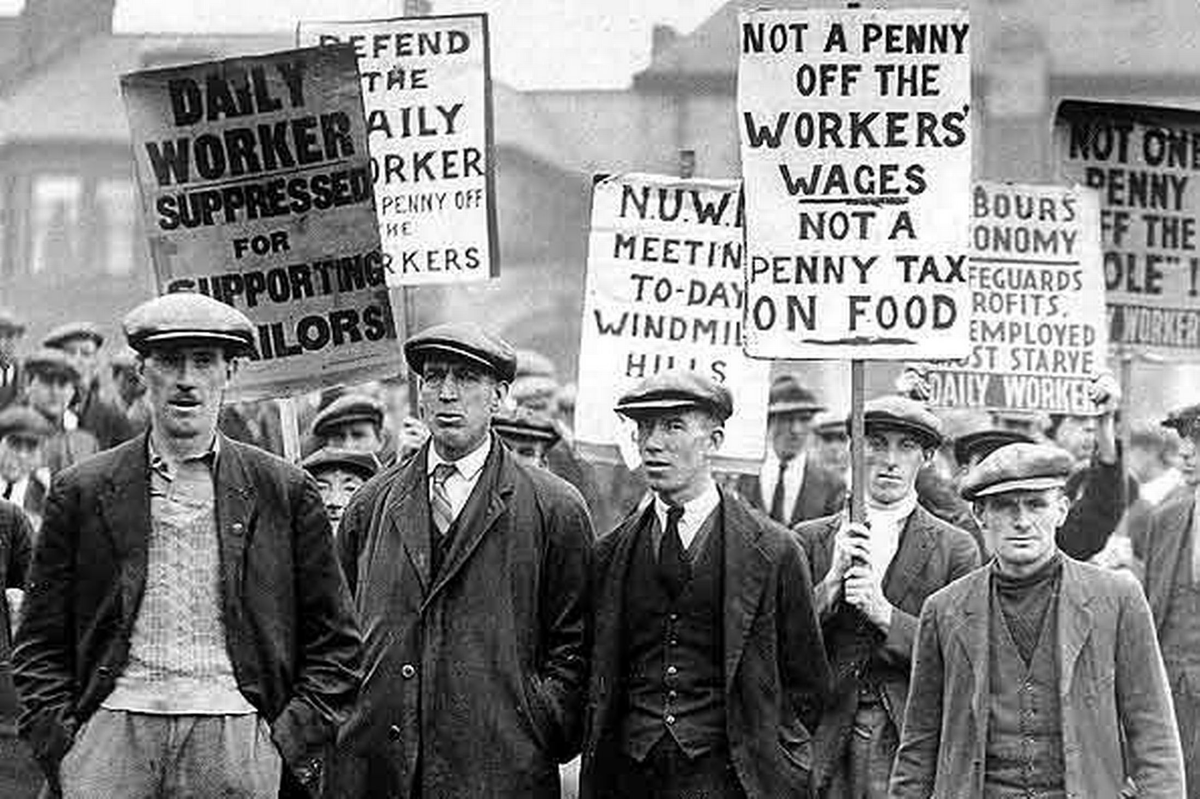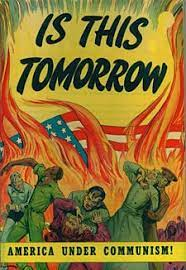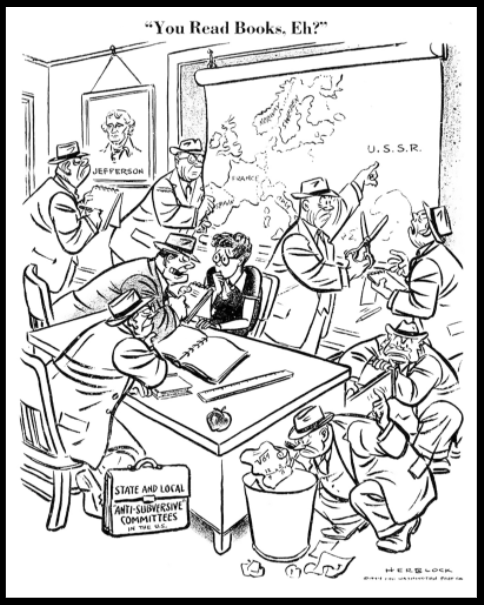
#THREAD
In 1950s USA, legislation barred the teaching of “subversive” doctrines: teachers were forced to take loyalty oaths & were required to teach the “American way” of “free enterprise”.
With the banning of anti-capitalism discussion in schools, are we heading the same way?
In 1950s USA, legislation barred the teaching of “subversive” doctrines: teachers were forced to take loyalty oaths & were required to teach the “American way” of “free enterprise”.
With the banning of anti-capitalism discussion in schools, are we heading the same way?
https://twitter.com/docrussjackson/status/1330467400064643077
Interesting 2020 article by historian Dr Jennifer Luff, who correctly points out that in Britain, anticapitalism wasn’t banned in English classrooms during the cold war – so why is it now?
dur.ac.uk/news/allnews/t…
dur.ac.uk/news/allnews/t…
Each Government shapes the school curriculum, & in 2020, the UK Government explicitly banned from English classrooms materials produced by groups with “extreme political stances”.
Most of these extreme principles – racism, antisemitism & authoritarianism – are uncontroversial.
Most of these extreme principles – racism, antisemitism & authoritarianism – are uncontroversial.
However, the list also includes opposition to capitalism: the “desire to overthrow democracy, #capitalism, or the end to free & fair elections”.
(Btw, the UK Govt has just removed the independence of the Electoral Commission - charged with overseeing free & fair elections).
(Btw, the UK Govt has just removed the independence of the Electoral Commission - charged with overseeing free & fair elections).

When the ban was introduced, Times columnist Daniel Finkelstein approved, writing that “enemies of capitalism have no place in school”.
Critics, including former shadow chancellor John McDonnell, branded the new rules McCarthyist.
Critics, including former shadow chancellor John McDonnell, branded the new rules McCarthyist.
Debates about whether to bar anticapitalist views from the classroom are not new. British lawmakers have considered similar bans many times since the 1917 Russian revolution.
Previous UK Govts ts refused to forbid materials from radical groups (including communists) from British classrooms, even at the height of the cold war, due to an ethos of British liberalism that devolved most curricular decisions to teachers & local authorities before the 1980s.
As a Times editorial put it in 1944, government should respect “the traditional British freedom accorded” to let teachers “teach, within broad limits, what seems best to him”.
In that context, the current government’s move seems particularly stark.
In that context, the current government’s move seems particularly stark.
In 1927, parliament considered banning “seditious teaching” of the “recognised Communist type which aims at destroying the existing Constitution & the order of things”.
The bill targeted both school classrooms & “Proletarian Sunday Schools”.
The bill targeted both school classrooms & “Proletarian Sunday Schools”.
The 1927 bill criminalised the distribution of literature in which “private property is anthematised as robbery”.
Its sponsor, Conservative MP Herbert Holt, highlighted materials such as the “Worker’s Child”, produced by the Young Communists’ International.
Its sponsor, Conservative MP Herbert Holt, highlighted materials such as the “Worker’s Child”, produced by the Young Communists’ International.

“Freedom of speech in this country has always been highly valued (but) the line must be drawn somewhere”. Despite worsening Anglo-Soviet relations & widespread domestic antiradicalism in the wake of the 1926 general strike, parliament let the bill die quietly in the report stage. 

In 1950, parliament again debated the influence of communist organisations on schools.
Tory MP Tufton Beamish - an executive of the 1922 Committee - complained that schoolteachers were “pouring revolutionary, seditious & atheistic propaganda into British children’s ears”.
Tory MP Tufton Beamish - an executive of the 1922 Committee - complained that schoolteachers were “pouring revolutionary, seditious & atheistic propaganda into British children’s ears”.
A handful of hard-right MPs were outraged, but thankfully - unlike now - they were in the minority.
It was a fact that left-wing groups such as the 'British-Soviet Friendship Society' were circulating materials for use in British classrooms.
It was a fact that left-wing groups such as the 'British-Soviet Friendship Society' were circulating materials for use in British classrooms.
However, "There is no evidence that, because teachers may read from Liberal pamphlets, pamphlets from the Tory Central Office or Transport House, or pamphlets about Russia written by Communists, they have allowed the information they have taken from them to influence their work."
As one MP remarked: “We have got to rely upon the commonsense and the judgement of the teachers.”
Back then, Conservative MPs trusted teachers, & Parliament agreed, again choosing to leave curricular decisions to educators.
The matter was largely settled for decades.
Back then, Conservative MPs trusted teachers, & Parliament agreed, again choosing to leave curricular decisions to educators.
The matter was largely settled for decades.
Meanwhile in the US, legislation barring the teaching of “subversive” doctrines proliferated. States and towns demanded loyalty oaths from teachers and required that schools teach the “American way” of “free enterprise”. 

By the early 1950s, school curricula had become a central focus of anticommunist crusaders such as Joseph McCarthy.
Seemingly anodyne elementary-school stories such as Robin Hood were held up as dangerous “communist” indoctrination in “robbing the rich to give to the poor”.

Seemingly anodyne elementary-school stories such as Robin Hood were held up as dangerous “communist” indoctrination in “robbing the rich to give to the poor”.


Of course, while the UK didn't embrace full-blown McCarthyism, British governments — both the @Conservatives & @UKLabour — indulged in their own anticommunist propaganda via secretive organisations such as the secretive Information Research Department.
jstor.org/stable/20097531
jstor.org/stable/20097531
British citizens, including teachers, were caught up in MI5’s extensive programme of clandestine surveillance & policing of suspected subversives, but Britain’s schools emerged from the cold war without the deep politicisation that McCarthyism inflicted on American education.
Given the above, this means that the Department of Education’s 2020 policy went MUCH further than any British government during the cold war, when communist movements around the world had successfully overthrown capitalist regimes.
Read that again.
Read that again.
It goes further than the #PREVENT antiradicalisation programme, which gave the state new authority to review curricula. Prevent guidance calls for students to “understand & discuss sensitive topics, including terrorism & the extremist ideas that are part of terrorist ideology”.
Prevent defines extremism as "vocal or active opposition to fundamental British values, including democracy, the rule of law, individual liberty & mutual respect & tolerance of different faiths & beliefs”: capitalism isn't a British value; anticapitalism is not an “extreme view”.
While the new curricular guidance applies only to the “relationships, health, & sex curriculum”, feminists have long insisted that sex & relationships have everything to do with capitalism & democracy - but it’s hard to imagine that fears of feminist ideas motivated the change.
On the other hand, movements such as Occupy and More likely is the fact that Extinction Rebellion have attracted mass followings with their systematic critiques of #capitalism, inequality & environmental crisis, & their appeal to young people may have motivated the Govt to act.
More likely, the UK Government is trailing a broader & sinister approach to curricular oversight, one that mirrors Trump’s announcement of a “1776 Commission” to promote “patriotic education” in the US, or Victor Orban’s national school curriculum reflecting “Hungarian values”.
The current debate on Critical Race Theory in the US shows School curricula becoming flashpoints for populist nationalist Govts around the world. It seems likely that given the UK often follows the US in cultural & political developments, the UK Govt may replicate this trend.
During the cold war, British officials & intellectuals were proud of Britain’s reputation for political toleration, especially in comparison to the abuses of American McCarthyism. The current "anti-woke" culture war UK Govt is characterised by creeping authoritarian intolerance.
In 1954, British prosecutor at the Nuremburg trials, Hartley Shawcross, praised British “doctrines of toleration & liberty” that gave citizens “the right even to attack our whole system of Govt. We have refused to allow ourselves to be stampeded by fear.”
How times have changed.
How times have changed.

This #THREAD is based on this 2020 article by Dr Jennifer Luff.
If you STILL don't realise just how much of a threat to British democracy, to free-speech, to tolerance, & to British values our increasingly authoritarian Govt is, imho, you need a shrink.
dur.ac.uk/news/allnews/t…
If you STILL don't realise just how much of a threat to British democracy, to free-speech, to tolerance, & to British values our increasingly authoritarian Govt is, imho, you need a shrink.
dur.ac.uk/news/allnews/t…
• • •
Missing some Tweet in this thread? You can try to
force a refresh






